
Holger Hantke (70) worked as a composer in the creation of a number of sheet music collections for the New Apostolic Church. Born in Lübeck and today a resident of Hamburg, he talks about his life and what he thinks of New Apostolic music.
Holger Hantke studied school and church music at the Hamburg University of Music, and linguistics and educational sciences at the University of Hamburg. He worked as a teacher and played the organ in many churches. He will soon celebrate a golden wedding with his wife.
The path to music
Did you take music lessons?
When I was seven years old, my parents signed me up to take piano lessons, and I made good progress. And after one particular pastoral visit at our home, the decision was made: “Holger has to learn to play the organ.” I started playing the organ when I was twelve. Our Apostle at the time, Karl Weinmann, arranged for the Church to pay half of the fees. I am very grateful to the Church for this!
What motivated you to compose?
My motive has always been to make music for the glory of God. That was the attitude with which I started composing. My first composition—I was maybe 14 years old at the time—was to set to music a passage from Revelation 14, which was preached repeatedly in connection with the second coming of Christ: “Lord, thrust in Thy sickle and reap!” That was a really strong expression in me, an image that lived in me to such a degree that I began to set these words to music.
I felt most comfortable with church music. To me, organ music is a moment of inner expression. You play the organ with a deeply believing heart. Music is touching. It goes straight to the heart.
Your orchestral movements, organ compositions and variations, as well as your choral arrangements, get a great deal of play in our Church. But how did you get into church music?
My grandfather on my mother’s side had a record player and owned the first records published by the Bischoff publishers. Two pieces in particular fascinated me as a child—I was around five years old at the time—and later as a schoolboy: “A Mighty Fortress is our God” (Hymnal 142) and “Praise Thou the Lord, the Omnipotent Monarch” (Hymnal 261 )—two choral preludes by Max Reger, played by Friedhelm Deis. Back then, I was impressed by the low notes of the pedal. And this more or less led me to church music as well.
“New Apostolic” church music
How did your collaboration with the music department at the Bischoff publishers come about?
Hermann Ober, head of the music department, was always on the lookout for choirs for record production. In 1968 he came to a divine service in Lübeck. I accompanied our congregational choir on the organ and then also when we recorded the record. That was how our first meeting came about, which led to my first commissioned composition for our Church—a quatrain that had to be set to music: “Not a single word is lost” (Choir folder 334).
I wrote and arranged many compositions for our Church: choral pieces for male choirs and mixed choirs, small cantatas for children’s choirs, larger orchestral pieces for the choral songs. However, it was into the “Organ Preludes” (1984) and the “Instrumental Playbook” Volume 1 (1986) that I really poured out my heart and soul.
How do you see the musical development in our church today?
A lot has already happened. The idea that music can also serve as a kind of preaching in addition to bringing worship and praise to God was not always understood in this way. And it used to be unthinkable that musicals would ever be created—as they are today—or that drums would ever be played in church.
Not only church music
You also direct a big band. Why jazz?
Because there is a lot of improvisation there, a lot of freedom. Jazz is the joy of variation. Unfortunately, it has been impossible to have rehearsals together for over a year now due to the pandemic.
Since 2016 you have been giving gospel choir workshops for New Apostolic choirs together with Timo Schmidt. How did that come about?
In 2000 I took over the gospel choir of a Protestant congregation, which I led for seven years. Timo Schmidt attended one of our concerts during that time. In 2015 he called me to tell me that he needed a pianist for the gospel choir workshop he was organising in our congregation in Blankenese. Since then we have been working together: Timo conducts and I play the piano.
Which of your compositions are particularly important to you personally and why?
First of all there is the song “No word is lost” (Choir folder 334), and the choral arrangement “I want to Love You, my Strength”, as well as the larger orchestral setting for the psalm “Lord, my God” (Choir folder 203), and my “Christmas Story for Children” .
I list these pieces because all of them have affected me personally, and because I stand behind them. The words from Psalm 71: 1-5: “In You, O Lord, I put my trust…” (Choir folder 203) are also my own personal credo. They live deep within my heart.




